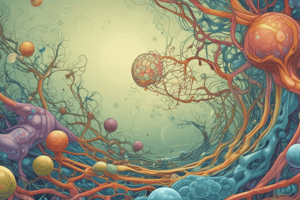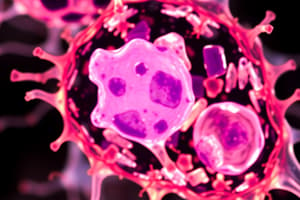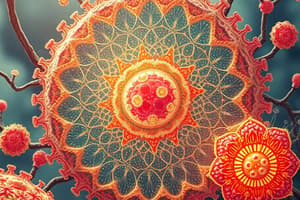Podcast
Questions and Answers
What is a characteristic that differentiates eukaryotic cells from prokaryotic cells?
What is a characteristic that differentiates eukaryotic cells from prokaryotic cells?
- Eukaryotic cells lack organelles.
- Eukaryotic cells do not have DNA.
- Eukaryotic cells have a nucleus. (correct)
- Eukaryotic cells are smaller than prokaryotic cells.
Which of the following processes takes place in the mitochondria?
Which of the following processes takes place in the mitochondria?
- Cellular respiration (correct)
- Photosynthesis
- Lipid synthesis
- Protein synthesis
What type of transport requires energy (ATP) to move molecules across a membrane?
What type of transport requires energy (ATP) to move molecules across a membrane?
- Facilitated diffusion
- Osmosis
- Diffusion
- Active transport (correct)
During which phase of cell division do homologous chromosomes separate?
During which phase of cell division do homologous chromosomes separate?
Which component of the cell is primarily responsible for modifying and packaging proteins and lipids?
Which component of the cell is primarily responsible for modifying and packaging proteins and lipids?
Which cellular process involves the conversion of light energy into chemical energy?
Which cellular process involves the conversion of light energy into chemical energy?
What type of cellular communication involves signals acting on nearby cells?
What type of cellular communication involves signals acting on nearby cells?
Which structure serves as the semi-permeable barrier of the cell?
Which structure serves as the semi-permeable barrier of the cell?
Flashcards are hidden until you start studying
Study Notes
Cell Biology Study Notes
1. Cell Theory
- All living things are composed of cells.
- Cells are the basic unit of life.
- All cells arise from pre-existing cells.
2. Types of Cells
-
Prokaryotic Cells:
- Simple structure, no nucleus.
- Contains DNA in a nucleoid region.
- Example: Bacteria.
-
Eukaryotic Cells:
- Complex structure, contains a nucleus.
- DNA organized in chromosomes.
- Includes plant and animal cells.
3. Cell Structure
-
Cell Membrane:
- Semi-permeable barrier.
- Composed of a phospholipid bilayer.
-
Nucleus:
- Contains genetic material (DNA).
- Site of RNA synthesis.
-
Cytoplasm:
- Gel-like substance where organelles are suspended.
-
Organelles:
- Mitochondria: Powerhouse of the cell, ATP production.
- Ribosomes: Protein synthesis.
- Endoplasmic Reticulum:
- Rough (with ribosomes): Protein synthesis, processing.
- Smooth (no ribosomes): Lipid synthesis, detoxification.
- Golgi Apparatus: Modifies, sorts, and packages proteins and lipids.
- Lysosomes: Digestive enzymes for waste processing.
- Chloroplasts (in plants): Site of photosynthesis.
4. Cellular Processes
-
Cell Division:
- Mitosis: Somatic (body) cell division resulting in two identical cells.
- Meiosis: Gamete (sex cell) division resulting in four genetically diverse cells.
-
Cellular Respiration:
- Process of converting glucose into ATP.
- Occurs in mitochondria (aerobic) and cytoplasm (anaerobic).
-
Photosynthesis (in plants):
- Conversion of light energy into chemical energy.
- Occurs in chloroplasts; produces glucose and oxygen.
5. Cell Communication
- Cells communicate through signaling molecules (hormones, neurotransmitters).
- Processes include:
- Autocrine: Cells respond to signals they produce.
- Paracrine: Signals act on nearby cells.
- Endocrine: Hormones travel through the bloodstream to distant cells.
6. Cell Transport Mechanisms
-
Passive Transport: Movement of molecules without energy.
- Diffusion: Movement from high to low concentration.
- Osmosis: Diffusion of water across a membrane.
-
Active Transport: Movement of molecules against their concentration gradient, requires energy (ATP).
-
Endocytosis and Exocytosis: Methods for large molecules to enter or exit the cell.
7. Key Concepts in Cell Biology
- Homeostasis: Maintenance of stable internal conditions.
- Apoptosis: Programmed cell death, essential for development and homeostasis.
- Stem Cells: Unspecialized cells with the ability to differentiate into various cell types.
8. Importance of Cell Biology
- Fundamental to understanding life processes.
- Key to advancements in medicine, genetics, and biotechnology.
Studying That Suits You
Use AI to generate personalized quizzes and flashcards to suit your learning preferences.




